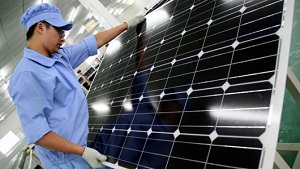Tariffs on Chinese solar panels could impact planned projects
 With the looming threat of tariffs on solar panels imported from China, a lot of utility-scale projects are at a standstill.
With the looming threat of tariffs on solar panels imported from China, a lot of utility-scale projects are at a standstill.
“It’s hard to say how tariffs could impact projects that are in development now,” GTM Research managing director Shayle Kann said at the Solar Power Generation USA Conference in Los Vegas last week. “I think most are taking a wait and see approach.”
Developers who have plans drawn up for solar plants that would use Chinese solar panels will have to weigh their options if the Department of Commerce and International Trade Commission decide to impose steep tariffs on panels imported from China.
The tariff would result from a trade complaint levied in mid-2011 by SolarWorld that Chinese solar manufacturers were receiving subsidies from the Chinese government that allowed them to undercut U.S. suppliers.
Much of what will happen depends on how steep a new tariff might be.
“A 10-percent margin would certainly not shut the Chinese product out of the market,” Kann said. “A 50-percent tariff would cause some reorganization.”
There has been speculation that a new tariff could go as high as 100 percent of the cost of the panels.
If there is a new tariff and it’s high enough, Kann said, Chinese companies would likely find a way around them by establishing plants in Taiwan or other parts of Southeast Asia.
In the meantime, projects currently in development would experience major delays while Chinese manufacturers move their operations.
“They could choose someone else,” Kann said. “Of course, they would have to unzip and rezip the financing, and they’d have to redesign the project.”
Ultimately, he said, any new tariff would likely impact projects currently on the drawing board. Those in the early stages of development are likely looking more favorably at U.S. solar panel manufacturers in light of the uncertainty that the situation brings to the Chinese product.
That uncertainty is something everyone in the industry is talking about, said Eric Ma, general manager for Talesun’s U.S. offices in California. Talesun is a new Chinese panel manufacturer that just finished building a fully automated plant that will be able to produce almost a gigawatt of panels a year.
The company sees China and the U.S. as its largest growth markets, Ma said.
It has 11 people working in its California office and is developing relationships with U.S. installers. If tariffs are levied, he said the company might consider establishing a U.S. manufacturing facility. But it’s hard to say now what it would do.
“We have to be prepared for the worst case,” he said. “But we also have to keep doing business.”
Photo: ZUMA Press.



